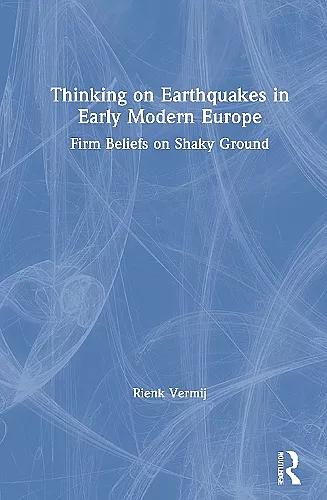Thinking on Earthquakes in Early Modern Europe
Firm Beliefs on Shaky Ground
Format:Hardback
Publisher:Taylor & Francis Ltd
Published:17th Nov '20
Currently unavailable, and unfortunately no date known when it will be back
This hardback is available in another edition too:
- Paperback£39.99was £39.99(9780367492182)

This book is the first extensive study of ideas on earthquakes before the Lisbon earthquake in 1755. The earthquake had a deep impact on European culture, and the reactions to it stood in a long tradition that, before this study, had yet to be explored in detail.
Thinking on Earthquakes investigates both scholarly theories and views that were propagated among the early modern European population. Through a chronological approach, Vermij reveals that in contrast to the Ancient and medieval philosophers who suggested rational explanations for earthquakes, supernatural ideas made a powerful comeback in the sixteenth century. By analysing a variety of sources such as pamphlets, sermons, and treatises, this study shows how changes in the ideas on earthquakes were a result of social and political demands as well as from improvements in the means of communication, rather than from scientific methods. Thus, Vermij presents an illuminating case for the production of knowledge in early modern Europe.
A range of events are explored, including the Ferrara earthquake in 1570 and the Vienna earthquake in 1590, making this study an invaluable source for students and scholars of the history of science and the history of ideas in early modern Europe.
'Following a chronological development, this volume represents an important synthesis of the scientific opinions and theories that have matured over the centuries in the European cultural sphere, showing how the ancient and medieval philosophers, who provided rational hypotheses for the origin of earthquakes, both switched to supernatural and sectarian explanations, diverting science towards social, political and religious needs.The analysis carried out by Rienk Vermij testifies to the cultural and knowledge development in modern Europe and represents a fundamental source for scholars of the history of geology and science.'
Marco Pantaloni, Geological Society of Italy, 2020 (https://www.socgeol.it/N2838/thinking-on-earthquakes-in-early-modern-europe.html)
'In short, Vermij offers a fascinating study on confessionalized science and the study of earthquakes. His sensitivity to the political and social use of earthquake explanations is commendable and a welcome addition to disaster studies. [...] His intention to also look at explanations among the wider populace and his inclusion of different media are innovative for a history of science.'
Marieke van Egeraat, Early Modern Low Countries, 2021
'Thinking on Earthquakes is a solid piece of historical research [...] this book fills a long-standing gap in the literature on the early modern understanding of earthquakes, and it will prove a valuable reference work for historians and philosophers of science as well as for geologists, teachers, and science communicators.'
Francesco Luzzini, Early Science and Medicine, 2021
'[...] As the book demonstrates, the subject of earthquakes can certainly serve as an excellent point of entry for inquiring into the shifting configurations of science and religion in early modern Europe. [...] Thinking on Earthquakes fills a gap in scholarship. It makes a valuable contribution to the history of geology, the history of science and religion, and disaster studies.'
Fa-ti Fan, Isis, The Journal of the History of Science Society, vol. 113, no.1, 2022
‘By providing a chronicle of the events, the volume is a worthy contribution to the history of those seismic beliefs and ideas that had developed in the European milieu over the centuries. The author points out how ancient and medieval philosophers, after suggesting rational hypotheses about the origin of earthquakes, moved on to supernatural and confessional explanations, turning science to social, political and religious needs. Rienk Vermij’s work not only bears witness to the cultural history of modern European society, but also is a fundamental source for historians of geology and science.’
Marco Pantaloni, Italian Institute for Environmental Protection and Research (ISPRA), Physis International Journal for the History of Science Vol. LVII (2022)
ISBN: 9780367492199
Dimensions: unknown
Weight: 453g
256 pages